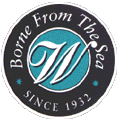The terms sea plants, marine algae and sea
vegetation are almost synonymous with the name Wachter and the Wachter family
of California. This statement is much less a demonstration of ego as it
is a statement of fact. Experience in the research and application of sea
vegetation and products to humans, animals, plants and soil encompasses
a period of many years from the times of ancient Chinese and Egyptian physicians.
Recently, various seaweed symposiums and gatherings of men of science interested
in mariculture have stimulated clinical research. Since 1932, the Wachter
family, led by its founder, Joseph V. Wachter, Sr., through Wachters' Organic
Sea Products Corporation in South San Francisco, California, has endeavored
not only to originate and continue systems of research in the field of marine
algae in these various applications but has, through its Josephine E. Tilden
Memorial Museum and Library, gathered the publications of the world involved
in the studies and applications of sea vegetation and has initiated continual
research accelerating into the 1980's. Research at the Corporation is conducted
under the auspices and direction of Dr. Joseph V. and Dr. Earl A. Wachter.
Much has been learned in recent years concerning various properties of sea
vegetation that was not earlier recognized. Sea vegetation would almost
seem to bee the perfect food for human consumption when we consider its
various nutritional contents. As an example, green seaweed inn general contains
a high cellulose and protein content forming large quantities of bulk in
the natural weed helping to stimulate peristaltic movement of the large
intestine to aid in proper elimination. High contents of carotene or Provitamin
A have been found In brown and red sea plants. In The Wachters' Blend, species
are dried with great care avoiding periods of rain which could cause a loss
of nutritional content. Recent reports from our laboratories show a high
content of Vitamin D naturally occurring in our blend resulting in the highest
known concentration of Vitamin D in natural vegetable form that has yet
been obtained from the blending of species of plants s. The B Complex is
well represented in selected species of sea plants. In the testing of over
25 species of marine algae it was found that Vitamin B12 content was generally
high. This high content was quite unexpected as it has previously been assumed
that microorganisms such as bacteria and streptomyces produced the richest
and most concentrated forms. Green algae is particularly high in Vitamin
B12 content and it accumulates mainly in the cell walls. This is why Wachters'
in its blend uses whole species of algae of different varieties, colors
and families blending them together in their sun-dried form preserving the
structure of the cellular wall. the importance of which is seen in its Vitamin
B12 content. Folic acid activity is found in brown species of sea plants
and research has shown that seasonal variations of folic and folinic acid
activity is great. Thus it is that careful harvesting at the proper time
is most important. Pantothenic is generally higher in green and red sea
plants than it is in the brown sea plants, as kelp from the Southern California
coast is commonly known. Niacin and Vitamin C are more potent in red and
brown algae.
A word should be said here concerning the difference between
fresh water and sea water algae. Sea water algae is. of course, marine algae.
This is what composes the Wachters' Blend of Sea Plants. The tremendously
high content of alginic acid found in sea algae has been shown to chelate
with Strontium 90 removing it from the digestive tract and bone marrow.
The ash or mineral and trace mineral contact is also most important. A valuable
source of protein, species of algae such as chlorella and spirulina contain
only a range of between 9 and 11 percent ash or mineral content. Sea vegetation
runs a minimum of 14 percent to a high of 44 percent with a mean average
of approximately 33 to 38 percent. So it is that a good representation of
minerals, vitamins, bulk forming factors and protective compounds such as
alginic acid are very valuable components of sea plants and are found in
abundance in The Wachters' Blend, It is sufficient to say that we at Wachters'
are making a concerted effort to disseminate to the public the true value
of the ocean's treasure chest of sea plants.
Among the species that have been either used in the past
or are presently being used in the Wachters' Blend of Sea Plants represented
by the red, brown and green family of sea plants are: Sargassum, Arthrothamnus,
Ecklonia, Laminaria, Chondrus, Rhodymenia, Alaria, Eisenia, Undaria and
Porphyra.
The species selected for inclusion in The Wachters' Blend
of Sea Plants are specifically chosen for their mineral, trace mineral,
vitamin, enzyme, protein, plant hormone, plant growth stimulator, plant
cell regulator, plant cell stimulant and other microfood factors.




